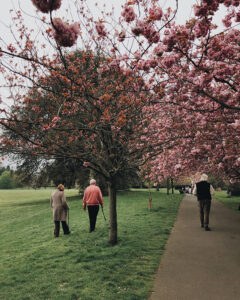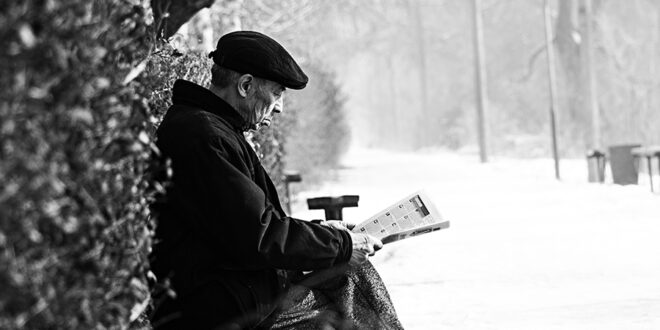 Every year as the winter months approach and the days get shorter, as cold wind chills our bones and steals our breath away, we all gear up to better prepare ourselves to stay warm and healthy. However, our aging loved ones face more unique challenges during the cold season. Low temperatures and social isolation may be challenging for the elderly, and not staying warm enough may subject them to a variety of health risks related to the cold.
Every year as the winter months approach and the days get shorter, as cold wind chills our bones and steals our breath away, we all gear up to better prepare ourselves to stay warm and healthy. However, our aging loved ones face more unique challenges during the cold season. Low temperatures and social isolation may be challenging for the elderly, and not staying warm enough may subject them to a variety of health risks related to the cold.
According to Government of Nepal, Department of Hydrology and Meteorology, the minimum temperature extremes are usually recorded in Nepal during the months of December to February. The coldest month is considered to be January, and recorded minimums are usually rare in other winter months. The average temperature of Kathmandu during the coldest month is 10 °C with the record minimum in the last 10 years being 0 °C. When compared to extreme weather conditions elsewhere, the winter months in Kathmandu would not be considered very harsh. For most people, these cold temperatures just bring about minor inconvenience that can be solved with warm clothes, hot drinks, and heaters. However, as one ages, the cold seasons tend to be increasingly difficult to brave.
Why do we feel colder as we age?
Normal human body temperature (normothermia) is stated to range from 36.5–37 °C (97.7–98.6 °F). The body’s ability to maintain its internal core temperature around 97 to 98.6 degrees is what helps us survive the cold. Our body’s normal response to exposure to cold stimulates cold receptors in the skin, which stimulate the sympathetic nervous system. Sympathetic stimulation causes the peripheral blood vessels to constrict, limiting blood supply to the skin, fingers, hands, and feet. This restriction of blood flow prevents heat loss and helps in conserving the core body temperature. With this thermoregulatory vasoconstriction, the body heat balance can be maintained within the range. As we age, our bodies become less adept at regulating internal body temperature. The body’s response to cold decreases, as certain body receptors may not respond quickly enough, so our blood vessels constrict and maintain our body temperature. As we age, our blood vessels lose elasticity and flexibility, which makes the blood circulation sluggish, thus hampering effective heat conservation.
Normal body temperature is maintained when there is regulated balance between heat production and heat loss. Older individuals also tend to lose body heat faster than when they were young. We have a layer of fat below our skin that helps conserve body heat. Older adults have a relatively thinner layer of fat under the skin, making them more susceptible to cold. Elderly with certain chronic health conditions could be more vulnerable to the cold. As mentioned above, blood circulation plays a significant role in how our body conserves heat. Conditions like diabetes and kidney disease have compromised blood flow leading to lower overall body temperature. Similarly, cardiovascular diseases like heart failure, coronary artery disease, and peripheral artery disease also hamper temperature regulation.
Elderly people with poor nutrition are more vulnerable to the cold. Our immune system generally weakens with age, which is made more pronounced due to inadequate nutrients. Nutritional deficiencies can lead to low levels of hemoglobin, leading to nutritional deficiency anemia. Hemoglobin carries oxygen to tissues throughout our body. In an anemic individual, our body will direct the oxygenated blood to important organs, such as our brain, kidneys, and heart. This leads to less blood flow and oxygen to the skin, hands, and feet, causing them to be cold.
Thyroid gland produces hormones that regulate functions like heartbeat, metabolism, and body temperature. According to experts, with hypothyroidism, metabolism slows, body temperature drops, peripheral vasoconstriction occurs, and the patient may feel cold even with a slight drop in temperature. Parkinson’s disease and arthritis are usually diseases of old age. These conditions can make it hard to put on more clothes and stay bundled up and warm. Alzheimer’s is another age-related condition leading to added challenges for the elderly to stay warm and healthy during winter months.
Certain medicines that help lower blood pressure like beta blockers and calcium channel blockers could cause cold hands and feet, because they can reduce blood circulation to our extremities.
Cold Weather Risks
Hypothermia
Hypothermia is the most common risk for the elderly during the cold weather. Hypothermia occurs when a person’s body temperature drops to a dangerous level. For an older person, body temperature below 95 degrees or below may pose health risks. As the mercury continues to dip throughout the country, every year, a number of deaths and illnesses due to hypothermia is reported from various parts of Nepal during the cold spells, especially among people living in poor socio-economic conditions . As hypothermia sets in, the body starts shutting down and may cause multi-system injury and increased mortality in the vulnerable. The most vulnerable age groups susceptible to hypothermia are children below the age of five and adults over the age of 65 years. In Nepal, we do not have effective home heating system in most houses. This causes prolonged exposure to cold both inside and outside the house. Elderly with chronic health conditions and living alone are more susceptible to hypothermia.
Heart Problems
Various studies have shown that there is no positive correlation between temperature drop and the occurrence of coronary heart disease. However, it is believed that as temperatures drop, seniors with cardiovascular conditions may experience worse symptoms. As peripheral vessels constrict to prevent heat loss and regulate body temperature, the heart has to work harder to keep the same volume of blood going through the vessels by overcoming peripheral resistance. This may lead to increased heart rate and a rise in blood pressure.
Influenza
Cold in itself does not cause illness, however, it makes it easier for viruses like the common cold or flu to infect individuals. Thus, seniors with compromised immune system are at a much greater risk of catching a cold or suffering from complications of the flu.
Joint Pain
Many elderly people suffer from chronic pain from arthritis. There is no clear explanation as to why this pain flares up as the temperature drops. Some theories believe the drop in barometric pressure can cause tendons and muscles to expand, causing pain. Some researchers believe that colder temperatures can thicken fluids inside the joints, leading to stiffness.
Falls
Falls are always a concern in the elderly in any season. However, in winter, wearing bundles of bulky layers of clothing could pose tripping hazard.
Asthma and COPD Trigger
As mentioned earlier, cold in itself does not cause a disease. Cold and dry winter air can, however, irritate the airways of people with lung diseases. This can worsen the symptoms of chronic obstructive pulmonary disease (COPD) and bring about wheezing, coughing, and shortness of breath. COPD is a condition that limits the flow of air in and out of the lungs. Many elderly people who are already combating lung disease may find the winter months challenging.
Fire Hazards/ Carbon Monoxide Poisoning
During winter months, it is common to use heaters, either electric or gas, to keep us warm. Precautions need to be taken, because gas heaters emit carbon monoxide, which in the absence of proper ventilation may cause carbon monoxide poisoning when inhaled. All kinds of heaters may pose fire risk. The elderly, especially if living alone, may be vulnerable to these kinds of accidents.
Loneliness and Depression
The elderly are liable to remain at home during to winter months to combat the cold. Social isolation and inactivity during the cold weather may trigger depression. According to the National Institute of Mental Health, seasonal affective disorder (SAD) is a form of depression that cycles with the seasons and is common in the winters. SAD affects the old and the young equally.
Safety Tips
Winter could be filled with fun and celebrations, if necessary practical steps toward cold weather safety for seniors is taken. It can help them brave the cold and even enjoy the season.
• Wear season appropriate clothing
Wearing season appropriate warm clothes that are light yet warm is advisable for the elderly. Wearing multiple layer of clothes that fit well without being constricting are important, because each layer traps heat to keep us warm. A warm jacket over the layers gives added warmth. Since 50 percent of the body heat is lost through the head, a hat or shawl helps. Warm socks and comfortable shoes even in the house helps them keep mobile and warm. Avoid wearing bulky, heavy clothing to prevent tripping and falling.
• Stay current on immunizations
Seniors with weakened immune system are vulnerable to cold and flu. Talking to your doctor about getting vaccinations for flu for adults over the age of 65 might be a good idea. Yearly flu vaccines are believed to help reduce the risk of flu-related complications.
• Consume a balanced diet
It is important to eat a balanced nutrional diet to boost our immune system. A strong immune system helps us fight diseases. Consume protein-rich diet and diet rich in vitamin D.
• Sit out in the sun
Vitamin D is synthesized in our skin in the presence of the sun. Sitting in the sun helps us get the necessary vitamin D. Spending time outside in the sun and fresh air not only helps combat the cold, it also helps with symptoms of SAD.
• Stay hydrated
People tend to drink less fluid during the winter. It is important to stay hydrated. Drinking your favorite hot drinks can help you keep warm and hydrated. Too much caffeinated drinks and alcoholic beverages must be kept to a minimum.
• Use heaters and electric blankets and warmers cautiously
Make sure the rooms are well-ventilated and the electric heaters are in good shape and the cords are not frayed. Flammable things are to be removed from in front of the heaters.
• Combat winter depression
Meeting loved ones or talking to them over the phone, or video chats, helps seniors feels less alone and helps drive the winter blues away. If you have elderly loved ones, make sure to check on them every few days to see how they are doing. Family vacations are also one way of bonding and getting the elderly out and about.
• Stay active
Just because of old age, people need not be confined to the house. Taking walks and light exercises are beneficial in maintaining core body heat, and also prevents a sedentary life style during winter in the elderly and ensures not only physical, but emotional well being, as well.
 Medicosnext
Medicosnext




